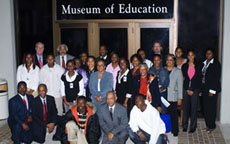

Social Activism and Civil Rights |
||||||||||
 William Skelton |
||||||||||
“The Dudley teachers were never in jeopardy in terms of their political beliefs. Jobs were never in danger, and many of the teachers worked during the elections as poll watchers and clerks. This was encouraged by Dr. Tarpley. He was politically minded and allowed us to work for civil rights.” William Skelton |
||||||||||
This research project falls within the realm of the “long civil rights movement”—an effort to examine the struggle for civil rights and social justice during the decades before the 1954 Brown v. Board of Education Supreme Court decision. One of the more complex questions that arises in the field of education concerns teachers’ efforts to engage in political and cultural struggle. Black teachers during the 1940s who were members of the NAACP ran the risk of losing their jobs; public statements and actions could have been life-threatening. Even support of unions could cause a teacher to be dismissed. Yet, many teachers at Dudley High School were actively involved in the NAACP, and discussions about Dudley and written accounts of race relations in Greensboro during this time suggest that Tarpley and many teachers were forceful and relatively successful in their quests for civil rights and social justice.
|
||||||||||
The Greensboro Two: |
||||||||||
Dudley High School and its role as a center for social activism during the 1940s and 1950s is a topic that calls for further study. During the 2007 oral history interviews, comments were made to suggest that any development of a social conscience from students emerged after high school. Yet, Tarpley and Dudley teachers where well aware of social injustices and engaged in efforts to instill courage among students as a way to work for civil rights and social justice. While the civil rights climate of Greensboro during 1950s and 1960s has been well-researched and documented through the writings and oral history interviews by William H. Chafe, William Bagwell, Trina Caviness Bethea, Josephine Ophelia Boyd Bradley, and The Way We Were project, much more research could and should be conducted. |
||||||||||

an institutional member of the International Coalition of Sites of Conscience
Museumofed@gmail.com

